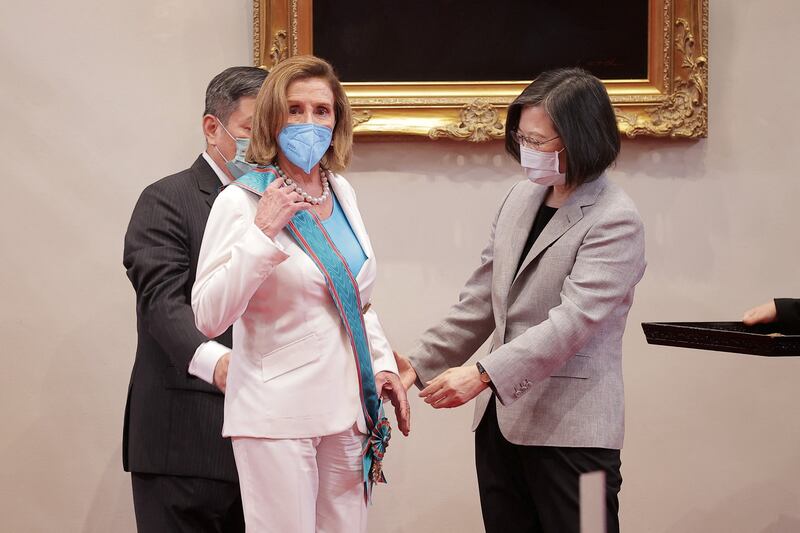A highly anticipated but also highly sensitive meeting between U.S. House Speaker Kevin McCarthy and Taiwanese President Tsai Ing-wen will reportedly take place in California instead of Taiwan after Tsai “convinced” the American side of China’s possible angry response.
Britain’s Financial Times was first to report on the relocation of the meeting, which was initially expected to take place during a planned visit by McCarthy to the democratic island.
The Pentagon was “preparing” for the House Speaker to visit Taipei later this year, Punchbowl News, a Washington-based political portal, reported in January. The news outlet added that the preparation was at an “early stage” and it would be “a herculean effort for the Pentagon” and another “diplomatic showdown” between the U.S. and China.
Beijing considers Taiwan a Chinese province and repeatedly protests against involvement by “external forces” in cross-Strait politics.

McCarthy’s predecessor, Nancy Pelosi, made a historic visit to Taiwan last August, the first by a speaker of the U.S. House of Representatives in 25 years. China responded by staging a week-long multi-branch military exercise around the island.
According to latest media reports, President Tsai is to make a visit to the Americas in early April. The tour will include stopovers in Guatemala, Belize and the United States, in both New York and California.
Republican Kevin McCarthy represents California’s 20th district.
The Taiwanese president also reportedly accepted an invitation to speak at the Ronald Reagan Presidential Library in Simi Valley, southern California.
Reducing tension
Some analysts see the change of venue as a tension-reducing measure.
“If the arrangements have been coordinated as we saw it, then all three sides can declare victory and lower the tension in the Taiwan Strait,” said Alexander Huang, a professor at Tamkang University in Taipei and former deputy minister at Taiwan’s Mainland Affairs Council.
“The key remains what Tsai will say during the meetings and speech,” he said.
Huang, who in the dual capacity of head of the Kuomintang Party’s Department of International Affairs made a visit to the U.S. in February, earlier said that from talks with McCarthy’s aides, and aides to other Republicans on Capitol Hill, he had the impression that McCarthy would “definitely” visit Taiwan at some point.
Beijing has already shown discontent, with new Foreign Minister Qin Gang telling reporters at the National People’s Congress (NPC) meeting in Beijing that Taiwan is “inseparable from the motherland” China and “if the Taiwan issue is not handled well, China-U.S. relations will be shaken.”
Whether the U.S. House Speaker visits Taiwan or not, “China will show displeasure either way,” said Wen-Ti Sung, a political scientist from the Taiwan Studies Program at the Australian National University.
“To prevent the impression of weakness, Taiwan and the U.S. may frame this meeting in California not as a replacement of an actual Kevin McCarthy visit to Taiwan, but an addition to it,” Sung suggested.
“That is, it’s an appetizer. A Taiwan visit will be the main course,” he said, “Presence of an appetizer now does not exclude presence of the main course down the road.”
‘No information’
Replying to questions about the Tsai-McCarthy meeting, U.S. State Department Spokesperson Ned Price on Monday said it's up to members of Congress to decide "the nature of the meetings" they are going to make.
Price however denied that he was “aware of any confirmed travel on the part of President Tsai to the United States.”
On Tuesday, Taiwan Foreign Minister Joseph Wu also declined to comment, saying he was not in the position to make any announcement but if required, his ministry would “arrange the best possible visit.”
Meanwhile the Taiwanese Minister of National Defense Chiu Kuo-cheng denied that any visit by the U.S. House Speaker to Taiwan would be canceled in the face of threats from China.
Chiu told the Legislative Yuan (Taiwan’s legislature) on Tuesday that Taipei wishes to have more friends who care about the peace and stability in the Taiwan Strait and if international friends want to show their support “we can only welcome it.”
The minister said that China had been looking for reasons to attack Taiwan, such as military purchases, visits to Taiwan by senior officials of other countries, or military exchanges between Taiwan and other countries.
Last August, when Pelosi visited Taipei, Chinese warships approached the island’s contiguous waters, the area that extends 24 nautical miles (44.4 kilometers) from the shores.
“This year, they are likely to make closer incursions, even into Taiwan’s 12-nautical-mile territorial waters,” Chiu said.
Taiwan will not allow “repeated provocations,” the minister said but insisted that his forces “will exercise restraint and won’t launch the first strike.”
Radio Free Asia (RFA), a news service affiliated with BenarNews, produced this report.
